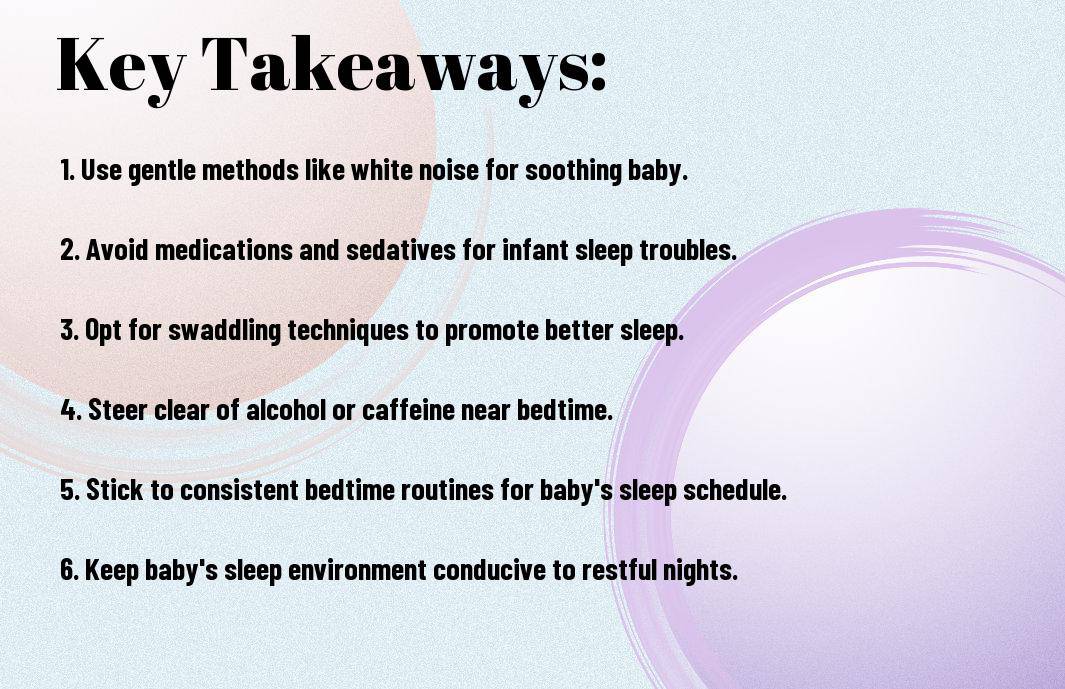tips, tricks and guides for parenthood
Helping your baby get a good night's sleep is crucial for their development and your sanity. However, when it comes to using sleep aids, caution is key. In this blog post, we will explore the different types of sleep aids available for babies, their potential risks, and what you should avoid to ensure your little one sleeps soundly and safely. By understanding the options and risks, you can make informed decisions about how to support your baby's sleep without compromising their well-being.

Creating a soothing bedtime routine and a calm sleep environment can help your baby drift off to sleep peacefully. Consider incorporating activities like a warm bath, gentle massage, or soft lullabies into your baby's nightly routine. Keep the sleep environment quiet, dark, and at a comfortable temperature to promote quality sleep.
Choosing the right sleepwear and bedding for your baby is necessary for their safety and comfort during sleep. Opt for sleepwear made of breathable fabric to prevent overheating and ensure a snug fit to reduce the risk of suffocation. Use a firm, flat mattress with a fitted sheet and avoid placing loose bedding, toys, or pillows in the cot.
Concerning using over-the-counter medications to help your baby sleep, it's important to exercise caution. Many of these medications are not recommended for children under a certain age, and even those that are may have side effects that can be harmful. Always consult with a healthcare professional before giving your baby any kind of sleep aid.
There are certain practices and devices that are not safe for helping your baby sleep and should be avoided. These may include using herbal supplements, alcohol, or sedatives to try to induce sleep in your baby. Similarly, devices such as wedges or pillows in the crib can pose a suffocation risk. It's best to stick to safe and proven methods for helping your baby sleep.
In terms of helping your baby sleep, understanding their sleep patterns is crucial. By recognising their natural rhythms and behaviours, you can create a conducive sleep environment that promotes restful nights for both you and your little one. For evidence-based tips on improving your baby's sleep, you can refer to The infant sleep aid: Evidence-based tips for better baby....
It's crucial to be aware of what constitutes normal sleep behaviours in babies. Newborns typically sleep for 16-17 hours a day, with frequent short naps and periods of wakefulness. As they grow, their sleep patterns evolve, and they start to develop a more structured routine. Understanding these changes can help you adapt your sleep strategies accordingly to meet your baby's sleep needs.
If you notice persistent sleep difficulties or unusual behaviours in your baby, it may be time to seek professional advice. Signs such as extreme fussiness at bedtime, consistent night waking, or difficulty settling down to sleep could indicate underlying sleep issues that require expert intervention. Consulting with a healthcare provider or paediatric sleep specialist can help address any concerns and provide tailored solutions to improve your baby's sleep quality.
To sum up, when it comes to aiding your baby's sleep, it's crucial to be cautious and informed about the potential risks associated with certain sleep aids. Natural remedies such as establishing a bedtime routine and creating a conducive sleep environment are usually safe and effective. However, be wary of using medications, over-the-counter drugs, or unproven methods without consulting a healthcare professional. Ensure to avoid products containing sedatives, alcohol, or other harmful substances that can pose serious risks to your baby's health. Always prioritise your baby's safety and well-being when selecting sleep aids, and when in doubt, seek guidance from a paediatrician or healthcare provider.
A: Common sleep aids for helping a baby sleep include white noise machines, swaddles, pacifiers, and gentle rocking or patting.
A: Yes, some sleep aids may pose risks such as suffocation if not used correctly, dependency on aids for sleep, and potential disruption of natural sleep cycles.
A: Sleep aids such as loose bedding, soft toys, crib bumpers, and sleep positioners should be avoided for babies to reduce the risk of suffocation and Sudden Infant Death Syndrome (SIDS).
A: Parents can create a good sleep environment for their baby by maintaining a consistent bedtime routine, ensuring the room is dark and quiet, and keeping the temperature comfortable for sleep.
A: Parents should consult a healthcare professional if their baby consistently has trouble sleeping, experiences unusual changes in sleep patterns, or if they have concerns about their baby's sleep health and development.